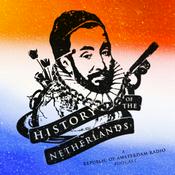Earlier this year we interviewed Andrea-Vicky Amankwaa-Birago, a German historian of Ghanaian descent.
Hang on, I hear you say, isn’t this podcast about Dutch history? Well, yes, of course it is, so here is a tidy little link.
Besides giving us a great insight into her life, having been born and raised in Europe as a member of the Ghanaian diaspora, Vicky’s current focus of study is the life of Kwasi Boachi, a prince of the Ashanti Empire who was born in 1827. The Ashanti empire covered most of what is today Ghana, as well as parts of Togo and the Ivory Coast. When Kwasi Boachi was 10 years old he, alongside his cousin Kwame Poku, was sent all the way from his home in West Africa to the Netherlands to be educated. This was a part of an arrangement made between Kwasi’s father, the Ashanti king Otumfuo Kwaku Dua I, and another king, William I, the King of the Netherlands.
The Dutch had a need of soldiers in the colonies, primarily in what is now Indonesia where many had been lost in a recent war of independence waged by natives against the Dutch governance of the East Indies. West African fighters appealed to the Dutch king and a deal was struck on his behalf that would allow the Dutch voluntary recruitment of local Akan fighters, in exchange for guns. To firm the ties even more, the two young princes joined the Dutch embassy back to Europe. After their studies were complete, they were both supposed to return to their homelands, bringing the knowledge and experience they had gained. Kwame Poku returned. Kwasi Boachi, however, did not.
Instead, Boachi completed his exams in civil engineering at Delft Royal Academy in 1847 and was assigned to become a mining engineer. However he went to Freiburg in Germany to study and live until he was sent to the Dutch East Indies in 1850. Whilst working in the East Indies, Boachi was heavily discriminated against by his superiors to such an extent that he actually received compensation and a monthly allowance for what he suffered. He remained in Indonesia until his death in 1904 when he was aged 77.
We spoke with Vicky when she was at an airport en route to Ghana. You’ll hear a few background airport noises and the sound quality was somewhat affected by dodgy internet, but Vicky’s enthusiasm and passion for her work more than make up for that. In our interview, she talks about Kwasi’s experience, especially as a black-noble living in 19th century Europe. We also discuss the African Diaspora and identity in Europe, how different nations utilise history and the idea of coming to terms with the past, and what she, personally, is out to achieve working as a historian in today’s world.
Vicky's Instagram page: https://www.instagram.com/anton_wilhelm_amo_erbschaft/?hl=en
Vicky's research (English): Building (b)ridges beyond the Portrait – Mapping Memories of Kwasi Boachi – Exit Frame!
Vicky's research (German): https://voices.skd.museum/building-bridges-beyond-the-portrait/ You can find all the paintings referenced in this link.
SHOW NOTES:
PATREON: https://www.patreon.com/historyofthenetherlands
BLUESKY: https://historyofnl.bsky.social/
Learn more about your ad choices. Visit podcastchoices.com/adchoices



